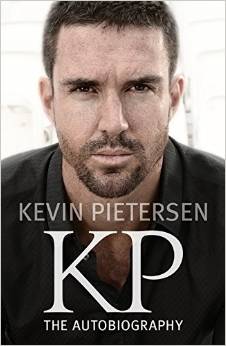REVIEW
By Lizzy Ammon
6 October 2014
Kevin Pietersen is nothing if not canny. This week is an international week in football meaning the sports media cycle is dead. He’s released his book. It’s an explosive read. In a quiet week, he’s getting maximum column inches.
He picked his ghost wisely in David Walsh, a brilliant writer who manoeuvred his way successfully through the murky world of Lance Armstrong to get to the truth. And I’m sure Walsh is due great credit for making what could have been a messy angry rant into a readable, hugely entertaining book. He’s made sense of more than a decade of KP “incidents”.
Of course, this book is Kevin’s view of events and it’s littered with exaggeration and hyperbole but underpinned with a real sense of rage, anger and bitterness – despite his claims throughout that he’s not bitter, and grateful for his time with England.
To separate what’s the truth, what’s exaggeration and what he’s conveniently missed out requires a bit of cross-referring to other sources, to what was reported at the time and what other players and coaches have either said or eluded to. It’s not an easy job.
But the book is Kevin’s reality. And Kevin’s reality isn’t necessarily exactly reality, although certainly you get the feeling that there’s at least an element of truth in everything he writes.
Nowhere do you get the feeling that Kevin was ever prepared to compromise or to change the way he was. That has been both his strength and his weakness throughout his career. But throughout the tales he recalls – especially in relation to last winter’s Ashes – there seems to be little compromise or understanding from those who worked with him and around him either.
Whether or not this book moves us any further towards what is nauseatingly called closure remains to be seen. There will be some nastiness before we get there. What we aren’t any closer to really knowing is the absolute truth. There’s the Kevin truth, there’s the ECB truth, there’s the Strauss truth, there’s the Flower truth, there’s the Prior truth and somewhere in amongst all of that is the actual truth.
PART of the ECB’s ‘truth’: A copy of the ECB dossier is available linked here
We’ll never know what that is but certainly it’s far too simplistic to write off Pietersen as narcissistic, self-obsessed and delusional. He’s a complex man driven by fear of failure, by insecurities, by his upbringing. He’s a classic introvert trying to be an extrovert through necessity. And if you’ll forgive a bit of pop psychology, he’s a deeply unhappy man and always has been. A man who thought that success might make him happy. It didn’t. Who thought money might make him happy. It didn’t. Desperately pretending he doesn’t care about being popular but actually really wanting to be and yet not knowing how to be.
Put all of that together and what you end up with is a supremely talented man who has an uncanny ability to piss people off.
Overwhelmingly, the book makes me angry with Kevin, even angrier with Andy Flower, even angrier with Giles Clarke and Paul Downton and desperately sad that things were the way they were.
It highlights the pomposity within the upper echelons of English cricket (Kevin too) and further illustrates how English cricket is its own worst enemy. If this had been Australia, they’d have sorted things out quickly and probably with a punch or two. Australia were in a mess after homework gate, they sorted it out.
There are some key themes that run throughout the book. His view of his England team mates. His view of Flower. His view of Prior. My view, as with everyone else’s, comes loaded with prejudices that I held before reading the book. Some based on talking to others, some based on what I observed and some based on nothing more than my unreliable gut instinct.
The main themes 1: KP on Flower
It won’t come as a shock to anyone that Andy Flower ran the England team with a culture of fear. Perhaps all the best managers have to have an element of fear to make them successful. Ferguson, Mourinho, Woodward. These aren’t soft and fluffy men. At times, Pietersen strays from a legitimate grievance into nothing more than whinge. Not being allowed to have his wife and child with him on tour when no one else was allowed theirs for example. Not being allowed to fly home for 48 hours in the middle of the tour to the West Indies. Strauss and Flower put their feet down on that. And fair enough.
However, there are some telling passages about the way that Flower’s regime turned from efficiently organised into too ruthless. This stacks up with what other players have said either publicly or privately. Particularly those who were on the periphery of the team.
KP describes Flower as dour and sour and rather brilliantly a “mood hoover” – and we all know what he means by that. He recalls various incidents that he uses to show Flower’s megalomaniac control over every minutiae of the players’ lives both on and off the field and as the book progresses you can see how slowly but surely the relationship between KP and Flower got beyond the point of repair.
Pietersen was never going to be the sort of character that Flower could either empathise with or understand and some of the fault there lies with Pietersen seemingly wanting special treatment. Equally though, Flower’s bizarre regime of control and intensity ultimately saw the breakdown of a once successful team. He has questions to answer over the handling of the Jonathan Trott situation and indeed, the Steven Finn situation.
Flower, brilliant though he was and exactly what England needed when they were in a mess, turned into someone who was no longer a wonderful mix of ruthless efficiency and empathy into something of a dictator. It’s a fairly classic progression of people in charge of a group of other people. They start out brilliant, they have success, it ends badly. Twas ever thus.
The main themes 2: KP on the “bullying culture”
Anyone observing the England team through the back end of 2012 and throughout 2013 will have noticed that there was something not right in that dressing room. England had become a very unlikeable team – chippy and arrogant and seemingly quite divided and ironically “disconnected” from the media and the public.
It wasn’t unlike a school playground. The cool kids. The ring leader. The kids not in the “in-crowd”. The head boy. The prefects. And an undercurrent of childish teasing and bullying. It was probably meant to be harmless. But what starts out as harmless can become quite toxic.
Pietersen himself is not completely innocent. He did his share of “bullying”. Certainly of James Taylor and probably others. But he was on the receiving end of it more than his fair share too. His mistake was to react to it. We teach our kids that often the best way to handle teasing is to ignore it and it stops. The more he reacted, the more those doing it would enjoy it.
It’s hard to imagine KP being the type of guy to sit crying in the corner of the room because he felt picked on, but perhaps he did. Or went on the attack as a form of defence.
Certainly, something wasn’t right in that dressing room – the infamous team unity that the ECB so readily harped on about and that they claimed was destroyed by KP. What seems far more likely is that it was a combination of other senior players, along with Kevin with some Flower at his worst thrown in that eventually finished off the successful England team of 2009-2013 along with a few of its most successful players.
The main themes 3: KP on Prior
This is where the book moved from being an explosive entertaining read and moved into unnecessarily spiteful and nasty. Pietersen’s view of Matt Prior goes beyond merely not liking him and into quite worrying levels of hatred.
None of the descriptions of Prior by Pietersen – a bully, a backstabber, teacher’s pet, arrogant – seem to be the Prior that others have described. KP describes Prior pretty unkindly in the book as “a Dairylea triangle thinking he was a brie”.
Naturally there is an element of arrogance in most sportsmen and Prior’s ability and desire to lead was invaluable to England through their period of success perhaps it went too far and he went beyond enthusiastic and vocal into bossy.
Prior was the man at the heart of trying to get KP back into the dressing-room after “text-gate”. Clearly something happened after that. The vitriol that Pietersen saves for Prior specifically rather than anyone else bar Flower, is odd to say the least.
No one at Sussex I have spoken to describes Prior as anything other than a good bloke, a good team mate and a pragmatic man to play cricket with. No one I’ve spoken to in the media or elsewhere has anything other than good things to say about Prior.
This particular part of the book really doesn’t stack up other than it’s completely possible that Prior could have taken over the dressing room post-Strauss. Cook, Bell, Anderson don’t have the personalities to do that. It’s easy to see how that might wind KP up.
Graeme Swann has been quick to defend Prior and you’d expect others to follow suit. He seems a genuinely popular character and it is there that you start to doubt KP. As with everything else in the book, there’s certainly an element of truth in what he says but with typical Pietersen gusto, he’s gone off on one.
If anything in the book loses him sympathy, it will be the nasty, spiteful and unnecessary gunning for Prior that does it.
KP: The Autobiography (Sphere) is released on 9 Oct 2014
.
Lizzy Ammon is a BBC cricket commentator and freelance writer and you can follow Lizzy on Twitter at @legsidelizzy
.










